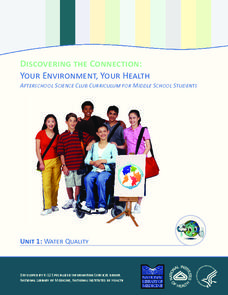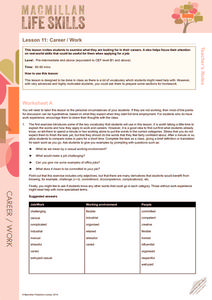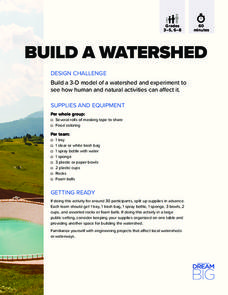WE Charity
High School–Module 5: Transportation Solutions
Planes, trains, and automobiles ... the abundance of today's transportation options comes at a hefty price. Using the fifth and final lesson plan from the WE Are Innovators—High School Modules set, pupils explore how modern...
WE Charity
High School–Module 2: Circular Economy and Nature
Everyone's heard the popular slogan reduce, reuse, recycle, but there may be a better way to talk about sustainability. Using the second lesson from the five-part WE Are Innovators—High School Modules series, learners explore issues...
Just Health Action
Environmental Justice Matters: Mapping Environmental Justice Impacts (Part 1)
A case study of Seattle, Washington permits class members to compare and rank how different areas of Seattle are impacted by environment burdens. Groups investigate different zip codes, collect data on five categories, and color-code a...
National Woman's History Museum
Country to City
After reading a series of primary source documents, groups compare the lives of and opportunities available to rural and urban women in the 19th century to rural and urban life in the 21st century. As an exit ticket, individuals craft a...
American Physiological Society
What Environmental Conditions Lead to the Hatching of Brine Shrimp?
Will changing the environment in which brine shrimp live impact their reproductive success? Young scientists get hands-on experience studying the habitat of brine shrimp in a two-week immersion lesson. The teacher's guide provides all of...
Beyond Benign
Leave Only Footprints
You don't need to tip-toe around an enlightening resource. Young environmentalists learn about ecological footprints in the fourth lesson plan of 15. Answering a questionnaire helps them see how their own families and homes affect the...
Howard Hughes Medical Institute
Ocean Acidification
Human impacts on the environment can sometimes be difficult to measure, especially under water! An activity centered on ocean acidification gives science scholars the opportunity to examine the effects of carbon dioxide on marine life....
Sports Museum
Boston vs Bullies: Facilitator's Guide
Score a big win for your school's environment with top-notch bullying prevention resources! The downloadable materials feature prominent sports figures from the Boston area talking about their experiences with bullying. Appropriate for...
Creative Learning Exchange
Lesson Plans From The Lorax
When it comes to the environment, no variable is constant. Class members graph behavior over time for the thneeds produced over truffula trees chopped down over the course of Dr. Seuss's The Lorax.
WE Charity
Elementary–Module 5: Transportation Solutions
How does transportation affect the environment? Using the fifth and final instructional activity from the WE Are Innovators—Elementary Modules series, scholars explore sustainable transportation. Pupils work in small groups to create...
University of Waikato
Farming and Environmental Issues
Forming ethical arguments is sometimes a complicated task. Guide classes through a process for forming and presenting ethical opinions. Learners consider the views of all stakeholders on the impact of farming on the environment and the...
National Library of Medicine
Your Environment, Your Health: Water Quality
How important is water quality where you live? The first module in a six-unit series includes four lessons on water quality. By applying the concept directly to the lives of pupils, they engage in meaningful learning. They read about...
Smarter Balanced
Environmental Interdependence (Environmental Awareness)
Whether introducing a study of environment awareness or preparing your classes for a performance task related to environmental interdependence, you will find this resource useful. Key terms and concepts are introduced so that all...
National Library of Medicine
Your Environment, Your Health: The Great Debate—Bottled Water vs. Tap Water in Our School
Should bottled water be sold in schools, or should they only provide tap water? The summative unit in the six-part series encourages scholars debating this topic. The lessons teach how to build an argument, how to gain background...
It's About Time
The Sun and Its Effects on Your Community
Why is the sun round? Examine this question, and others, with your pupils while teaching them how to live in a more earth-friendly environment. Pupils explore Sun composition and discuss how solar wind, sunspots, and solar energy affects...
Leadership Challenge
Helping Students See the "Gift" in Feedback
How can you help pupils view feedback as a blessing and not a curse? Lesson seven in a series of 12 character and leadership activities focuses on the S.A.R.A mindset and how to support budding leaders in their journeys toward the...
EngageNY
Close Reading: “Dog Sleds” and “Kayak”
Visualize it! Scholars read pages 12–15 of The Inuit Thought of It and create a visual gist of the text. They then do a close read of the text and create a natural environment anchor chart before answering text-dependent questions.
British Council
Fast Fashion
Fashion Facts! Learners analyze a worksheet about fast fashion in which clothes are made cheaply so people purchase more. Pupils discuss the effects this type of fashion has on the environment before exploring the benefits of upcycling.
University of Wisconsin
Conjunction Function
As part of a unit, this lesson familiarizes youngsters with components of a rain garden. They speculate about the role of an assigned component in contributing to a rain garden, and ultimately, in the health of the local watershed. Each...
Habitat Conservation Trust Foundation
Greenhouse Gas Game
You will need to gather a number of tokens, bags, and other various game components in order to incorporate this activity into your curriculum. Different tokens represent carbon dioxide, methane, and nitrous oxide. Printable 8.5"x11"...
Macmillan Education
Career/Work
Learners explore their perspectives of different occupations, discover what life skills will be valuable to them in whatever career path they choose, and discuss important terms related to the work environment.
DiscoverE
Build a Watershed
What's the best way to learn how watersheds work? Build one! Combining engineering, the water cycle, and ecology concerns, the activity is the perfect fit for an interdisciplinary unit. Teams construct a model watershed with simple...
Curated OER
Empty Oceans
In groups of four, pupils brainstorm about seafood. They view the Monterey Bay Aquarium Seafood Watch website to examine the problems caused by the seafood industry. Learners are then brought back together to discuss what they...
Environmental Protection Agency (EPA)
Teachers' Guide to Using A Day In the Life of a Drop
Hydrology hopefuls learn about their local watershed. Through discussion and online interactives, they see that their habits affect the water supply. The lesson concludes with a pledge to filter out bad water usage habits. It makes a...
Other popular searches
- Environment Science
- Environmental Science
- Environmental Resources
- Environmental
- Environmental Health
- Human Impact on Environment
- Environmental History
- Our Environment
- Human Environment
- Environment Volunteering
- Environmentalism
- Environment Research Projects

























